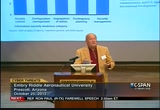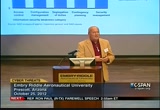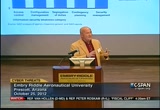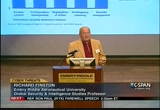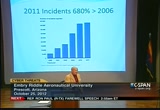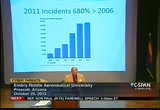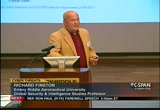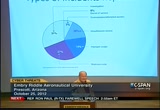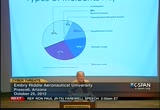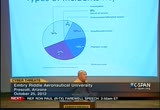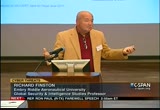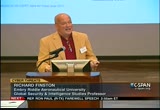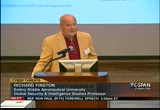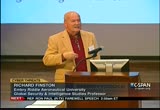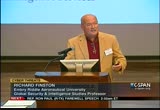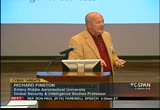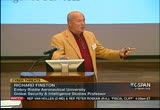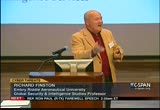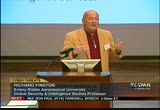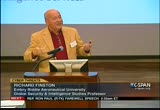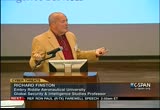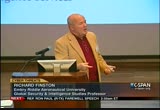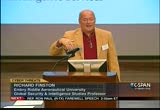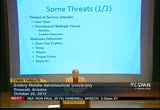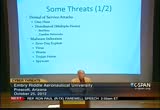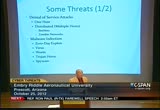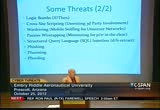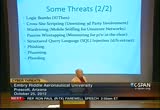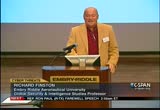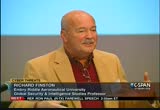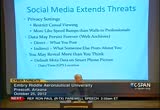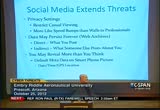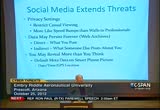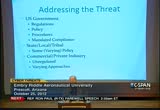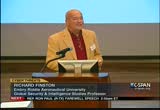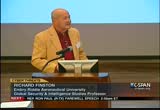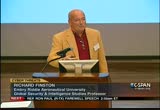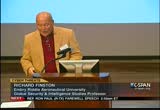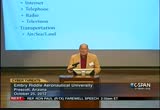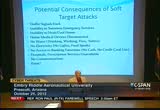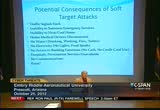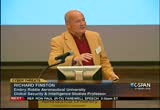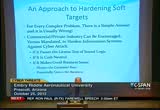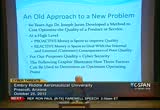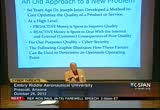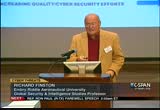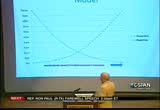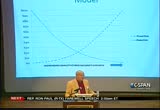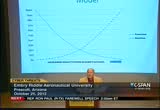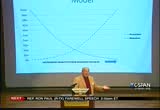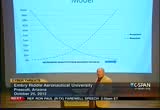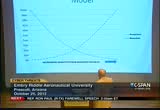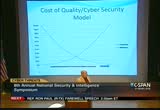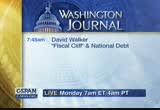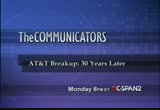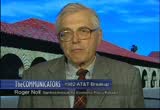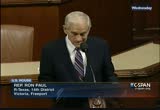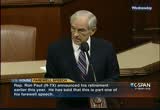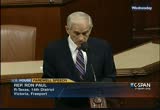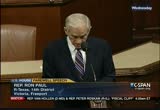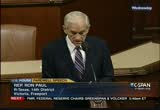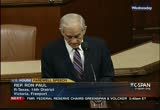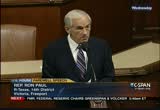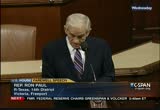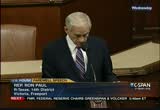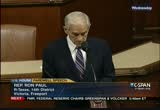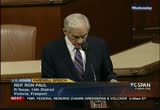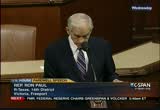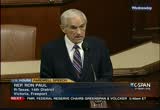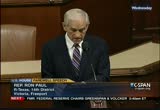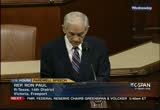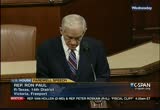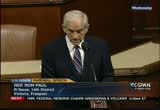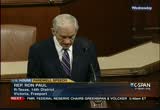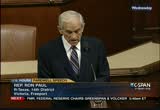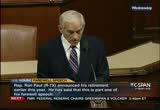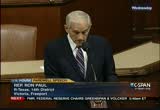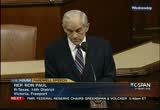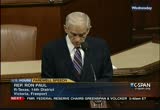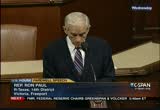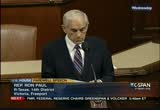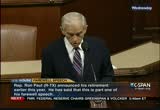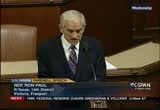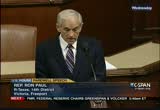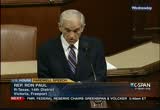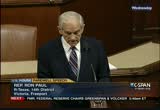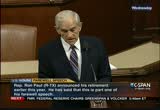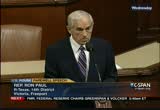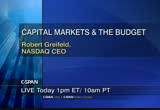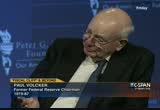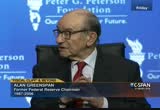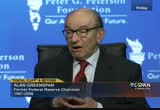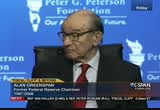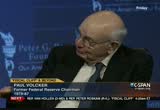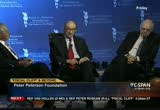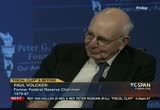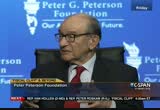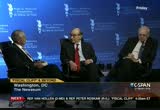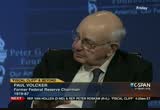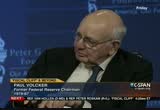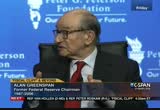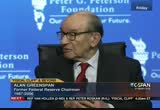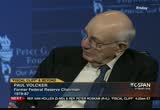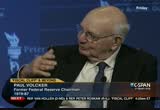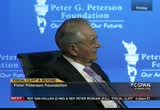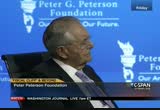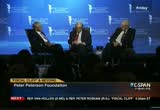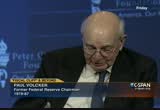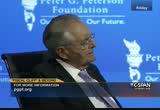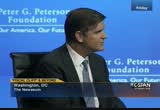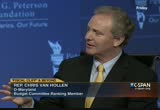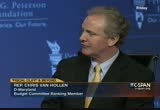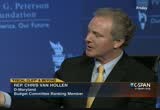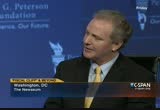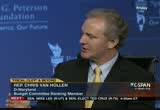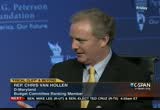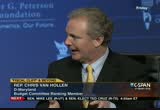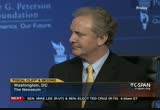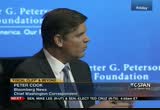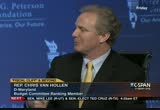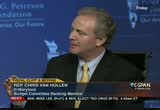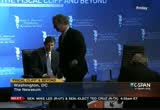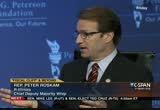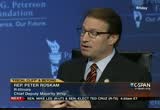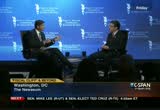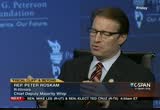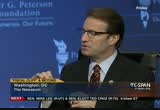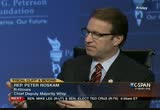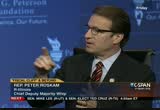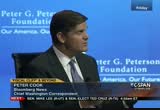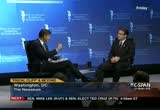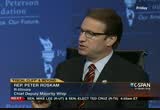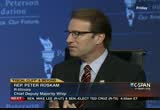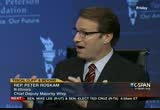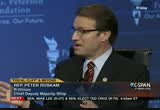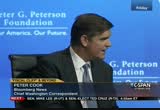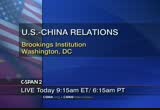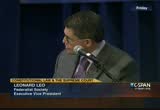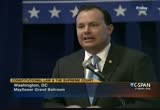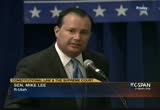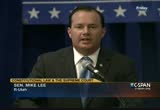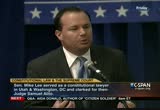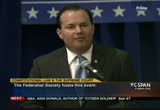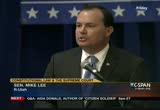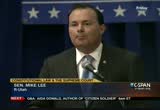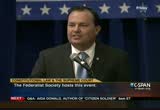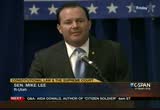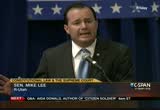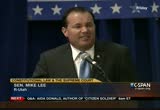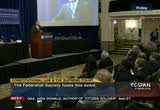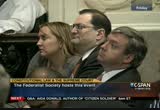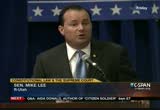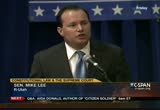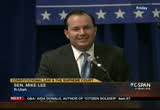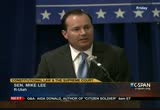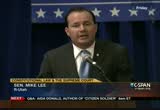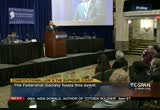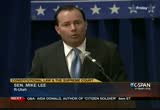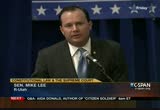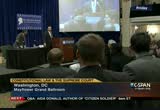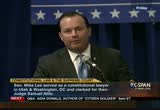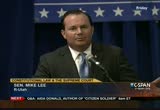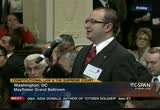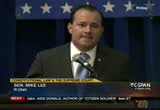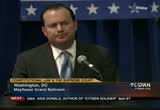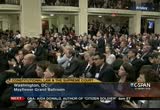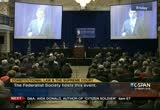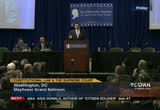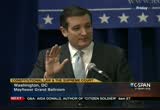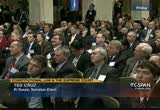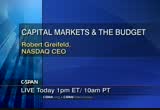tv Washington This Week CSPAN November 19, 2012 2:00am-6:00am EST
2:00 am
we are talking about here, it contains certain restrictions and privileged information, classified information not everyone should have access to. in that big body of knowledge there are still pipes or buckets or what we call compartments of informations in the totality of one classification system that further restrict access. based on a need to know basis. just because you have the secret clearance on a particular project -- you have no need to know so you do not have access to the information. those of the two components, basically, of access to information. all 24 agencies were shown -- people who do not have the clearance or access were getting in permission and people who have access to the clearance level of and permission are getting information they do not have a need to know for. that is pretty serious. configuration management, what does that mean?
2:01 am
in information systems, made up of a collage of hardware and software, different manufacturers, serial numbers, version numbers, and as you well, all using personal computers, anti virus updates almost every day. vulnerability updates for microsoft if you are using a pc that are addressing boehner build is they discovered every couple days. they easily --vulnerabilities they discovered every couple days and patched up. it is very important you keep your start -- software and hardware up to current configuration c do not have any vulnerabilities. almost all of those agencies are reporting they are not doing that. segregation of duties -- this may not be the most important. this is the fox guarding the hen house. you have secured personnel responsible for security management. those should be different
2:02 am
people than the people who have just general system administration functions. in general when you get into a very trusted organization many times this person could be one and the same. then you have contingency planning or disaster recovery. this deals with if something does happen, and a natural disaster or a man-made disaster or an attack, can you get back up if your system crashes? you have redundancy behind it? is it running in parallel with your current system, a hot backup so it ultimately goes over -- automatically goes over, or is there some process for you back up your data every day, every week, every month? you store it on site in case you have to restore a system? that all goes into contingency planning. then there is security management. that is what process and procedure you used to assure that all your required features and assurances to make sure your
2:03 am
operating in a safe and secure environment are in place. those other things you are not doing begin to recognize, you start doing. that again, those of the weakness as reported at those 24 agencies other than the intelligence community. now, if you look at, and this is again the gao data, these are computer incidents reported from 2006 through 2011. you can see there has been a 700% increase in that from 5000 incidents up to 45,000 incidents per year. that is just those that have been reported and detected. many incidents go on that are not detected. when we are talking about cyber security and cyber warfare and
2:04 am
cyber attacks we have incidents that pops up from time to time and hit the news. we all read about them, but in the event there is a true systemic cyber attack it would go after all of our systems, all of our vulnerability iies. much of we see here is probing -- in the old civil war days when they sent a scout out to detect where the enemy was. that is happening in the cyberworld. many of these are just probes to sea, are these militias intrusions been detected? what happens if they are detected? so they found a vulnerability or a back door in the system. again, let me just try to catch up. that is the u.s. government
2:05 am
excluding the intelligence community. let us presume, and i do not know the number, i do not want to know the number, let us presume those other top 17 agencies in the intelligence community are having an equal number of attempted intrusions. add another 45,000 to these -- 90,000 incidents per year. that is roughly one attempted intrusion every five minutes. state,, let's add local, tribal governments. in that vast pool we call the private sector, private industry -- the numbers go through the roof, even conservatively. i am leading toward an understanding that cyber attacks and intrusions are kind of a
2:06 am
continuum. they're happening all the time. going at all the different sectors. now again, from that gao report, if you look at the types of intrusions being reported, you have in this pie chart here, 31% of the incidents reported are still under investigation. something happened, something abnormal. we got a warning somebody tried to get in or a computer system crashes and we try to repeat it and it will not be proved. we have to reload and image of the parent system and get it going again. something happens and we do not know what. that is still under investigation. 31% of those 45,000, the 90,000, which is really what? 250,000 going on all the time.
2:07 am
that is really distressing. we talked earlier -- previous presentations talk about denial of service attacks, where a system or a company or whatever is deluged with requests or overloading the servers. things shutdown and stop. we show of all the incidents reported -- none of those were denial of service. that means that systems have a firewall and it has a setting for known a malicious intrusions. the signature of a denial of service attack is a lot of very similar messages coming in almost simultaneously. a fire wall with the right people and settings can prevent a basic low-level denial of service attack. that is what we're seeing here. then we have the attended
2:08 am
probes -- 7% there. these could be lines to see where a line of defenses are, how effective they are. unauthorized access -- people with no clearance at all getting into classified systems are people who have that clearance getting classified situations -- systems to do not have a need to know. getting that information, either wittingly like they're trying to get at them and they should not or in some cases unwittingly, it is click on the wrong folder and it pops up saying the do not have permission to go there. i hope nobody is watching, but they are -- that is why is being reported. and improper usage. throughout the government and private industry, i will flip back for one second, some of your here in the morning and saw i came in here with a memory stick and asked the i.t.
2:09 am
technician to stick it in and applaud my presentation. -- up load my presentation. did he know what was on that memory stick? do you know now that all of you at the end of the semester are going to get a's because your grades are going to get changed? you actually paid $1,000 to much tuition and will get a refund? i could have done that. i did not. [laughter] but you wish i did. anyway, this is kind of -- this is common practice. i trust a person -- i come in here, i could have unwittingly step something on here, maybe something on the memory stick i did not know was on there. i distill this presentation. i took some source material -- images from the gao report. you should trust that report.
2:10 am
you should, but there may be something imbedded in their. -- in there. getting into the system is not hard. improper usage of the system is going into the system -- we look at this federal systems from the department of energy, department of education, in addition to this with all the hundreds of thousands of government employees, we come to april 1 or april 2, getting to the tax time and they have not had time to do in income-tax. in my briefcase i have my cd of turbo tax. i am at my government machine. i say at lunch time i will do my income taxes -- i left turbo tax on there and put my financial information. it is running on the department of education system. all that privileged and
2:11 am
protected information. i take that the cd and go home and i stick it in my other machine and send it off to the irs. it has been on the government's system, unauthorized software, should not have done that but i did -- added material to it. i do not know what else can with it when i took it off. it is on and on. this is improper usage. not necessarily malicious intent. potentially damaging to information systems. then there is malicious code. we all know about that -- the viruses and the trojan horses. these are detected by the signature. after one of these is recognize the industry jumps on it, comes up with a virus definition. there are many different versions, quarantining, get rid of it, neutralize it. that is after it has been identified some or else. there is a thing we are going to talk about later called a
2:12 am
malicious attack. that is a grand -- brand new virus. a brand new piece of malware nobody has seen before. there is no signature for a period when it goes out there and spreads to thousands of machines, it let it ride through. it starts doing what it should not be doing gri. those events are very damaging. everything starts with a zero day event. after that we create signature and understand. in that vast mountain called a data base. now to threat origins -- this is not an exhaustive list. our friends from the fbi were talking earlier about a number of these -- let's start with
2:13 am
the criminal groups. organized crime, they can have a systemic content. they want to also may be pro the law enforcement sensitive systems to get information to understand what threats against them are. then there are small-time criminal operations intent on fraud or identity theft. these may be small groups or individuals. then you look at hackers, those who are just the techno geeks to do it to see if they can, go after systems not protected. then of course the hackers can be hired by any of these other -- origins to further their crimes. we have insiders, could be disgruntled employees who want to harm that information system and disrupt the company or agency's operation. or the insider could be a spy.
2:14 am
taking that information and passing it to his or her handler and passing it to a foreign intelligence service. then we have nations and state- sponsored threats. i do not want to steal any thunder from dr. jones's presentation on chinese threats tomorrow, but i want to talk about, there were some comment questions earlier about, could, what are the level of our defenses? could it cyber attacks cause a war? all this -- what are the issues here? lots of issues. one of them goes back to an old paradigm probably 20 or 30 years ago that was called mutually assured destruction. in the nuclear age, during the cold war. it is very germane to us here. the only remaining type of missile silo is outside of
2:15 am
tucson. they turned it into a museum now. you can go into the quarters and look at the missile -- is still there, they took the engines and out.bond omb there are railroad ties across the top -- the russians would look down and see that it can not move. all our other silos have been blown up and filled with concrete. we had 50 at one time. the titan missile had a range of 9,000 miles and carried a 10 million ton hydrogen bomb warhead and clear an area, make a hole in the ground about eight to 900 square miles. we had 50 of those. the russians had a similar size of missiles. both sides get together and said, this is stupid. neither of us can afford to do anything. a treaty was formed. we agreed to destroy the miss
2:16 am
stiles, poured concrete -- destroy the missiles, " concrete in the silos. level the playing field. in cyber warfare, the cyberworld, the landscape is naturally tilted. it is not like that. we cannot level the playing field. i will tell you figurative reasons why -- i will give you three examples. right now, the people that are not necessarily that friendly with us, who may do less harm in the future, hopefully never, russia is one, a lot of computers, russia is much like we are in terms of understanding of the cyber threat, having a lot of smart people doing offensive development primarily for the purpose of -- think of how many ways we can be attacked. also thinking for every measure
2:17 am
there is a countermeasure. how do we defend ourselves against potential attacks? we are being proactive and reactive at the same time. putting a lot of money and effort into our government to create a u.s. cyber command. the russians have institutionalize this and have buildings and people and very smart individuals designing ways to disrupt and corrupt systems and do bad things, as we are to our potential adversaries. that mutually assured destruction may be still works between russia and the united states. now let's take a quick look at one of the worst place today in the world -- north korea. they have got atomic bombs, they are a rogue regime, a lot of people there, a lot of smart people, like there are everywhere in the world. they have definitely got a cyber warfare operation activity going
2:18 am
on. in the united states, today, there are about 250 million computer users, and if you look at service providers and internet domains, that number doubles to about 500 million, half a billion in the united states. a lot of people doing a lot of things in cyberspace. do you know how many users, computer users there are in north korea? any guess? >> a handful. >> a handful. the numbers range around 600. 600 vs our 250 million. for service providers and internet domain names, we have
2:19 am
500 million. in north korea, seven. talk about a tilt the playing field. they could attack us and do some things that would be devastating, but we could not return the fire. there is nothing there to attack. they have not put their social order on the world wide web. everything is hard wired, it is manuel, people do not bank, do not communicate, do not control utilities. many times in new -- north korea they do not have been utilities to control. things like that. there is nothing to go back to the plan field -- is totally tilted. mutually assured destruction does not apply here. let's look at a difference -- dr. johns will go into a lot of
2:20 am
detail. china, many more people, about twice as many computer users as we have. a very literate country, very smart people. when the u.s. government wants to buy microsoft products, not the u.s. government and agencies asked bill gates and microsoft, we are going to bite your product. we want your source code, which is the details of how your systems work. bill gates says, no, nobody gets our source code. it is proprietary. we do not get it in america. china -- we have people here who want to go on the internet, we are willing to pay license fees and are willing to pay your -- we want your source code. he says now.
2:21 am
and we sit by the way, not only do we want your source code, we want you to make unique modifications to the microsoft systems. he says no, i do not do that. it is all the same. then he looks to the numbers and bill gates says, i guess i will give you the source code and the modification. you have heard of the great wall of china -- there's also the great fire wall of china. that country, with all those users, i'm going a little bit over the top on this, but not far from it, they can basically throw a switch and shut the rest of the world off. we do not have that capability. is the planned field even? is a mutually assured destruction? not in the cyberworld. not in cyber warfare. beyond all that good news, we have the phishers.
2:22 am
i will talk more about them. the spammers, the terrorists, people conducting industrial espionage, and our foreign intelligence services which are obviously connected to the state sponsored nations but have a different mission, not necessarily there to disrupt and destroy but to collect information to further their national agendas. some of the threats, we talked about the denial of service attacks. in fact, the gao report showed none of those incidents or a tax or denial of service. that is because there are other -- your only limited by your imagination. remember the basic paradigm -- a locke will only keep out an honest man.
2:23 am
there are possibilities of denial of service attacks even with strong firewalls in place, more sophisticated approaches. the denial of service attacks can come from one host or can be much more sophisticated and be distributed. your computer could be carrying what we call a botnet. you have downloaded something, someone has been able to be in your system and insert some code that will react on command to start sending messages to another system trying to overload. that is called is on the networked. -- a zombie network. we all watched the zombie movies, a person dies and then they come back to life. do bad things. that is a zombie network.
2:24 am
we talk about the zero day exploit being the most dangerous because we do not know what it is. we would not recognize it if it showed up right in our face. it does what it does. only after there has been a big issue do we have a signature and characterize it. then it becomes part of our virus update. we have the worms that are self- propagating, destructive malware in the system, a trojan horse, something that you let in but is something that you really do not want, that does something bad to your computer. then there is spyware. suffer that gets on your computer and gives people -- software that gets on your computer and can monitor your keystrokes, your typing, can look at your registry, can see your
2:25 am
passwords, can see what kind of encryption your using, can do a lot of stuff which you do not wanted to do. -- what it to do. do.it to productsur amlwarmalware are reactive systems vs. projected systems. we talked about pro-active vs. reactive -- we will talk more about that when we get to the solutions for the problem. some of the threats, again, continuing now, are logic bombs. these are software subroutines inserted into your system that just sit there and wait for something to chew them. is a if-then code.
2:26 am
a certain event happens, the logic bomb says, go do this. it could say, turn off all your voltage limiters for transmission lines. if the code comes in and that logic bomb sees it, what ever it was programmed to look at, it sends out a command to turn off all your voltage limiters and your power distribution lines and transformers go out and power goes out on the electrical grid. this has happened before and can happen again. cross-site scripting, an unwitting third party is involved in sending out malicious attacks to your computer. wardriving, mobile sniffing, people or individuals or groups are going around connecting and
2:27 am
searching for unsecured networks and then getting into that network and launching m alware, making you part of their malicious attack or whenever they decide to go after. passive wiretapping, looking for encrypted passwords and special query language, sql injection, going to act as a database but modify the database. arming, phishin, that is throwing a scene out there and see if it grows. phooling, spoofing, deception, trickery, provocation, all that. when my favorite topics is social media -- one of my
2:28 am
favorite topics is social media. this opens up the world to abuse. i should reset for one moment -- one thing i forgot to talk about in the beginning that just came to mind -- why is all this able to occur? years ago, when darpa, the defence research project agency funded able company called b.b.n to work on a way to communicate -- they invented something called the internet, which turned into the world wide web. the basic tenet was people are good, people are honest. we want something that is lightning fast and wide-open and everybody can use that and no one will abuse it.
2:29 am
the cornerstone of how the internet came about was based on that. unfortunately, everyone is not good, everyone cannot be trusted. people will do bad things. that is why we are we are at. social media -- it is a great thing. people love to use it. the whole social media industry has exploded. we are still concerned, even though we like to communicate with people -- privacy settings on facebook and everything. they do restrict casual viewing. but they are more like speed bumps then waltz to professionals who will get in and do bad things or corrupt your data or try to steal your identity. your privacy settings, like i say, will keep -- remember, a lot will only keep out an honest man.
2:30 am
never put anything on social media, on facebook, your page, that you do not want everyone in the world to see forever. the way it has gone -- even though website might be gone, if you do not want the information out there, do not do it. we know you are talking to people, and you say, i am going to be out of town for the next week. i hope no one robs my house.
2:31 am
did you would not say that, but you can give people clues as to what you are doing and how you are doing it unintentionally. you are revealing a lot more than you think, because the default settings when you post a photo on facebook, in that picture, which is a accessible for anyone, it also has a gps location and the date and time. you think you are being clever, and you are not supposed to reveal you are in a certain country within the intelligence community, you could take a photo in the room somewhere in some of the country's you are
2:32 am
not supposed to beat, and how will they know where we -- where i am? they will. someone could look at properties and pull out your location. there is so much there. you are playing with fire. there are three approaches. there are government regulations. there is the information management act the tells people
2:33 am
what they should do. the national institute not without statistics on how that should be addressed. those slowdown to procedures different organizations use. the dia was ahead in terms of accreditation, and they had a discount process. there was the director that has been replaced by the intelligence community director.
2:34 am
it lays out a set of processes and procedures to make save your information system, and it works. it really does. talk about taking a drink of water from a fire hydrant, it really does. the government cannot mandate compliance. they do it in a way where they say, here is a procedure we want. everybody, do not do it. they can come forward and say, whoever made the degree will say, just do it. somehow you will figure out a way to do it. it goes in place. the government has the ability
2:35 am
to protect itself and to enforce its systems. nothing is perfect. we are not perfect, but things are not that bad. everyone understands these are issues that affect us all. we have 50 states, and how many different state policies? 50. some of them are one-liners. they are randomly affective. then you have got a giant commercial who'll, which is an unregulated.
2:36 am
they understand to take -- to stay in business they have to tolerate, so we move forward. there has been a lot of talk about congressional action, and this decision is going on. president bush had this going on for eight years. clinton is into this, too, so it is not new. there is hesitance the government should not dictate certain things. there is a giant push back. it is also an understanding there is a vulnerability here.
2:37 am
2:38 am
air is hybrid too. they insult on vulnerabilities. you really look at all they say and do. they are fairly soft targets. aside from our little demonstration, some potential consequences of a fiber attack, this would be national. this would not just be pointed at one city or state, but imagine north. , who we could not strike back at. -- imagine north korea, whom we
2:39 am
could not strike back on. even your cellphone would not work, even though they are battery powered. this is going on and not for a few minutes late at the beginning of the presentation of four days, weeks, and months. there is no water, no electricity. what if there is a fire? troilus -- toilets. the sewage treatment is not working. no lights. your food spoils. no cash, no credit card use. hospitals are out of service. here is something.
2:40 am
we rely more on the web, and that growing alliance makes us more vulnerable with every step it takes h. about six months ago i went to my doctor for a routine physical. why don't you just write a paper description? he said, i cannot. he said, because of federal standards if i write a prescription, i get fine.
2:41 am
-- fined. there is one thing if we choose to go more web center. -- centric. there is no communication. you can see how this would lead to panic. this could be a reality. ok, enough debbie downer. for every complex problem, there is a simple solution. private and commercial industry can be encouraged to protect themselves from all this.
2:42 am
number one, if it passes the litmus test of sound logic, how can they do something different and not cost anything? i am going to show you. is this needs to grow and make customers happy. -- business needs to grow and make customers happy. is there a way to do this? i am going to offer a solution. this may not be the right solution, but always end with upbeat approach. 50 years ago the doctor developed a method for cost and quality.
2:43 am
years ago when you go into the store you pick up a knickknack and it says, made in japan. it was kind of a joke. you set it down very carefully so it would not break, because japanese quality was terrible. japan embrace it, institutionalize it, and you look today at japanese cars versus american cars. japanese consumer electronics versus america and electronics. it is no longer you look at it and put it away. you see made in japan, and you could it in the shopping cart. -- you put it in the shopping cart. readhing the japanese didn't
2:44 am
it with quality region one thing japan did -- we went through all this, and it was very hard to get our management interested in monitoring, measuring, and using this. there are pro-active things we can do to prevent bad things from happening, and there are reactive costs you incur because you did not do it right or you let something bad happen. as for the purposes, i am going to show you a graph, and if you
2:45 am
can take this away in your thoughts. cost of quality and cost of cyber security model. i am going to explain this chart. what i have depicted is we go from left to right, increasing cyber security, increasing protection, increasing ability to thwart or negate cyber attack. on the vertical scale i assure you zero to $100. this indicates proactive efforts.
2:46 am
2:47 am
the service is gone. aside from having to repair, they are giving money back to their customers. customers are not going to be happy. if they go to a competitor, they are going to be out of business. reactive costs are not something you want to get into. what you have got is everything is reactive. bad things happen. let's start to creep up this line. the pro-active costs. what would some of those be? we have some procedures making
2:48 am
sure they are secure. we train our people how to use them properly. we have back up and redundancy in case we have system or partial system failure. we have fire walls preventing malicious intrusion. we go a step further, and we have two fire walls. the second one goes through the second fire wall. it is much more powerful, and we think we did everything we could
2:49 am
do. all of these things cost money to do. as we are doing those things and incurring a proactive cost, we are moving our security to the right. we said if we did nothing we would have been irritated customer base at $100. at this crossover point, we have done something. we reached this point where we spent $20. it comes down to this point. we spent $40.
2:50 am
we have moved quality. we spent $40, and our customer is happier than doing nothing. that really is pretty simple. saying it and doing it are two different things, but this is our purpose. i am not saying this is the minimum. . -- the minimum point. if you operate here who are still alive $40. -- still at $40.
2:51 am
your customers would be less happy. you take your optimum point. where do you want to operate? you want to operate as far to the right as you can while minimizing your total cost. you have to really get it and revisit it a couple times. it makes so much sense. i prepared a presentation just on quality, and my boss took it of the corporate train and presented it to the company president, and he looked at that chart, and he stared at it and said, that is brilliant.
2:52 am
resurrecting it, explaining it is the way forward, so with that, i hope i ended on a more optimistic note. it is not the only way. there are probably a lot of other ways, and it is a challenge to do it. i hope you enjoyed the presentation. if you have any questions, i guess we have got time. thank you. >> tomorrow, david walker, former comptroller general talks
2:53 am
about his ideas for avoiding the so-called fiscal close, followed by a look at oil production and a new report about the energy production in 2020, and later we will talk about how they handle as therime and knowledge. -- and as he announced. -- and espionage. they will discuss national security challenges as the country prepares for transition. live coverage begins tomorrow on c-span 2. >> the mindset of the world well
2:54 am
into the mid 1990's was access with stuff on poles or buried in the ground was the key to understanding communications. the intriguing part of the story is how very few people inside the industry -- that is why the report came out the way it was -- it was not just judge greene who did not understand wireless. it was the entire industry, except a few visionaries. what turned out to be the case was the hope some people had you could have a robustly competitive six line -- fixed line industry where people are offering telephone service.
2:55 am
that vision was mistaken. >> wasn't a good idea to break up at&t? they discussed the pros and cons monday night at 8:00 eastern on the communicators. >> ron paul delivered his farewell address last week. paul is representing texas. he ran three times, as a libertarian in 1998 and as a republican. paul retired from the house to run for the senate. he will be reelected in 1996. his farewell remarks are about 45 minutes. >> this may be the last time i
2:56 am
speak on the house floor. at the end of the year, and i will leave after being in office over 36 years. my goal is to promote peace and prosperity by strict adherence to individual liberty. it is my understanding the course of the u.s. embark upon would bring a major financial crisis and over extend us and undermine our national security. now to achieve these goals, the government would have to shrink in size and scope, reduce spending, change the monetary system. the problems seem to be overwhelming and of possible to solve, but from my viewpoint, following the constraints placed on the constitution would
2:57 am
be a good place to start. how much did i accomplish? in many ways, congress accomplished very little. in spite of my efforts, the government has grown exponentially. taxes remain excessive, and a prolific increase of incomprehensible regulations continues. wars are constant and pursued without decoration. deficits rise to the sky. poverty is rampant, and dependency on the federal government is worse than any time in our history. all of these with concerns of liability common sense tells us cannot go on much longer. a grand but never mentioned
2:58 am
bipartisan agreement allows for the well-kept secret that keeps spending going. one side does not give up a penny on military spending. the other does not give up on welfare spending. the spending continues as the economy weakens and the downward spiral continues. our liberties and wells burn in the flames of a foreign policy that makes us less safe. the major stumbling block to real change in washington is the total resistance to admitting the country is broke. this has made compromising just to agree to increase spending inevitable because neither side has any intention of cutting spending. the country will remain a divisive since there is nothing left to divvy up. without this, spenders will continue to march toward a
2:59 am
fiscal cliff much bigger than anticipated in january. i have thought a lot about why those of us who believe in liberty as a solution have done so poorly in convincing others of its benefits. if this is what we claim it is, the principle that protects social economic decisions necessary for national prosperity and the best chance for peace should be an easy sell, that history has shown the masses have resented the promises of authoritarian, of which are rarely if ever fulfilled. should we have a authoritarianism or liberty? if the authoritarianism leads to poverty or war or less freedom for individuals or is controlled by special interest, the people should be begging for liberty? there certainly was a strong incentive for freedom at our
3:00 am
founding unmotivated those to fight against the powerful british government. at my time in congress and the appetite for liberty has been weak. the understanding of the significance is negligible, yet the good news is compared to 1976, when i first came to congress, the desire for more freedom and less government in 2012 is much greater and growing, especially in grassroots america. college-aged students are with great enthusiasm welcoming the message of liberty. i have a few thoughts as to why the people of a country like ours allowed the conditions to deteriorate to the degree that they have. freedom, private property, and voluntarily contracts generate wealth. in our early history we were very much aware of this. and the only part of the 20th century our politicians promoted
3:01 am
the notion that the tax and monetary system had to change. if we were to involve ourselves in excessive economiesic and military spending, that is why congress gave us the federal reserve and the income tax. when americans and many government officials agreeing that sacrificing some liberty was necessary to carry out what some claim to be progressive ideas. pure democracy became acceptable. they failed to recognize that what they were doing was exactly opposite of what the colonists were seeking when they broke away from the british. some complain my arguments ke no sense since great wealth and the standard of living improved for many americans over the last 100 years, even with these new policies. t the damage to the market economy and the currency has been insidious and steady.
3:02 am
it took a long time for consumer wealth to destroy the currency and get our obligations to a point of no return. confidence sometimes lasts longer than deserved, most of our wealth todaydepends on debt. . it allowed concerned for the principle of a free society to be neglected. as long as most people believe the material would last forever, worrying about protecting a competitive productive economy and individual liberty seemed unnecessary. the age of redistribution, this neglect ushered in an age of redistribution of wealth by government, to any and all special interests except for those who just wanted to be left alone. that is why today money and politics far surpasses money currently going into research
3:03 am
and development and productive entrreneurial efforts. when material benefitsecame more iortant than the understanding and promoting the principles of liberty and a free market. it is good that material benefits is the result of liberty but materialism is all that we care -- but if materialism is all that we care about, problems are guaranteed. the crisis arrived because the illusion that wealth and prosperity would last forever has ended. since it was based on debt and a pretense that debt can be papered over by an out-of-control fiat monetary system, it was doomed to fail. we have ended with a system that doesn't produce enough even to finance the debt and no fundamental understanding of why a free society is crucial to reversing these trends. if this is not recognized, the recovery will linger for a long time. bigger government, more
3:04 am
spending, more debt, more poverty for the middle class, and a more intense scramble by the elite special interests will continue. we need an intellectual awakeng. without an intelleual awakening, the turning point will be driven by economic law, a crisis will brg the current out-of-control system to its knees. if it's not accepted that big gornmentfiat money, ignoring liberty, central economic planning, welfarism and warfarism caused our crisis, we will expect a continuous march toward comparptism and fascism with even more loss of our liberties. prosperity for a large middle class, though, will become an abstract dream. this continuous move is no different than what we have seen in how our financial crisis of 2008 was handled. congress first directed with bipartisan support bailouts for
3:05 am
the wealthy. then, it was the federal reserve with the quantitative easing. approximate at first you don't succeed, try again. qe-1, qe-2, qe-3 and then qe-indefinitely until it, too, fails. there is a cost to all of it. and i assure you delaying the payment is no longer an option. the rules of the market will extract its pound of flesh and it won't be pretty. the current crisis elicits a lot of pessimism and the pessimisms -- the two feed on themselves making our situation worse. if the underlying cause of the crisis is not understood, we cannot solve our problems. the issue of warfare and welfare, deficits, inflationism, corporatism, bailouts and authoritarianism cannot be ignored. by only expanding these
3:06 am
policies, we cannot expect good results. everyone claims support for freedom, but too often it's for one's own freedom and not for others. too many believe there must be limits on freedom. they argue that freedom must be directed and managed to achieve fairness and equality, thus making it acceptable to curtail through certain liberties. some decide what and whose freedoms to be limited. these are the politicians whose goal in life is power. their success depends on gaining support from special interests. we don't need more isms. the great news is the answer is not to be found in more isms. the answers are to be found in more liberty, which costs so much less. under these circumstances, spending goes down, wealth production goes up and the
3:07 am
quality of life improves. just this recognition, especially if we move in this direction, increases optimism which in itself is beneficial. the followthrough with sound policies are required which must be understood and supported by the people. but it is good evidence that the generation coming of age at the present time is supportive ofoving in the direction of more liberty and self-reliance. the more this change in direction and the solutions become known, the quicker will be our return to optimism. our job for those of us who believe in a different system than the one that we had for the last 100 years has driven us to this unsustainable crisis is to be more convincing that there is a wonderful, uncomplicated and moral system that provides the answers. we had a taste of it in our early history. we need not give up on the notion of advancing this cause.
3:08 am
it worked but we allowed our leaders to concentrate on the material abundance that freedom generates while ignoring freedom itself. now we have meter, but the door is open out of necessity for an answer. the answer available is based on the constitution, individual liberty and prohibiting the use of government force to provide privileges and benefits to all special interests. after over 100 years, we face a society quite different than the one that was intended by the founders. in many ways their efforts to protect future generations with the constitution from this danger has failed. skeptics at the time of the constitution was written in 1787 warned us of today's possible outcome. the insidous nature of the erosion of our liberties and the reassurances our great abundance gave us evolved into
3:09 am
a dangerous period in which we now live. dependency on government largeess. today we face a dependence on government largess for almost every need, our liberties are restricted and government operates outside the re of law, protecting and rewarding those who buy or coerce government into saving their demands. here are a few examples. undeclared wars are commonplace. welfare for the rich and poor is considered an entitlement. the economy is overregulated, overtaxed and grossly distorted by a deeply flawed monetary system. debt is growing exponentially. the patriot act and fisa legislation passed without much debate, resulted in a steady erosion of our fourth amendment rights. tragically, our government engages in preemptive war, otherwise known as aggression with no complaints were the
3:10 am
erican people. the dron warfare we are pursuing worldwide is destined to end badly for us as the hatred builds for innocent lives lost. once we are financially weakened and militarily challenged, there will be a lot of resentment for their way. it's now the law of the land that the military can arrest american citizens, hold them indefinitely without charges or trial. rampant hostility toward free trade is supported by a large number in washington. supporters of sanctions, currency manipulation and w.t.o. trade retaliation call the true free trader isolationists. sanctions used to punish countries that don't follow our orders. bailouts and guarantees of all of misbehavior are routine. sanctions through monetary policies, mandates has been
3:11 am
acceptable policy. i have a few questions. excessive government prompts many questions. why are sick people who are -- who use medical marijuana put in prison? why does the federal government restrict the drinking of raw milk? why can't american manufacturers rope -- why aren't americans allowed to use gold and silvers legal tender as mandated by the constitution? why is germany concerned enough to consider repatiating their gold held by the fed for her in new yo? is it that the trust in the u.s. and dollar supremacy beginning to wain? why do our political leaders believe it's necessary to thoroughly audit -- why do our political leaders believe it's unnecessary to thoroughly audit our own gold? why can't americans decide which type of light bulbing
3:12 am
they can buy? why is it the t.s.a. permitted to abuse the rights of any american travel by air? why should there be mandatory sentences, even up to life for crimes without victims as our drug laws require? why have we allowed the federal government to regulate commodes in our homes? why is it political suicide for anyone to critical apac? why haven't we given up on the drug war since it's an obvious failure and violates the people's right? has nobody noticed that the authorities can't even keep drugs out of the prisons? how can making our entire society a prison solve the problem? why do we sacrifice so much getting this -- getting necessarily involved in border disputes andivil strife around the world and ignore the root cause of the most dangerous deadly border in the world -- the one between mexico and the united states? why does congress willingly
3:13 am
give up its prerogatives to the executivbranch? why does changing the party in power never change policy? could it be that the views of both parties are essentially the same? why did the big banks, the large corporations and foreign banks and foreign central banks get bailed out in 2008 and the middle class lost their jobs and their homes? why do so many in the government and officials believe that creating money out of thin air creates wealth? why do so many accept the deeply flawed principle that government bureaucrats and politicians can protectus from ourselves without totally destroying the principle of liberty? why can't people understand that war always destroys wealth and liberty? why is there no little concern for the executive der that gives the president authority to establish a killing list, including american citizens, of
3:14 am
those targeted for assassination? why is patriotism thought to be blind loyalty to the government and the politicians wh run it rather than loyalty to the principles of liberty and support for the people? realatriotism is the willingness to challenge the government when it'srong. why is it that people won't or can't take care of their own needs that people in government are able to do it for them? why did we ever give the government a safe haven for initiating violence against the people? why do so many members defend free markets but not civil liberties? why do so many members defend civil liberties but not free markets? aren't they the same? why don't more defend both economic liberty and rsonal liberty? why are there not more individuals that seek to intellectually influence individuals to bring about positive changes, those that
3:15 am
seek changes -- than those who seek power and force others to obey their commands? why does the use of religion to support a social gospel and preemptive wars both which require authoritarians to use violence or the threat of violence go unchallenged? aggression and forced redistribution of wealth has nothing to do with the teachings of the world's grea religions. why do we allow the government and the federal reserve to disseminate false information dealing with economic and foreign policy? why is democracy held in such high esteem when it's the enemy -- when it's the enemy of the minoritynd makes all rights relative to the dictatesf the majority? why should anyone be surprised that congress has no credibility since there's such a disconnect between what politiciansay and what they do? is there any explanation for all the deception, the
3:16 am
unhappiness, the fear of the future, the loss of confidence in our leaders, the distrust and anger and frustration? yes, there is. and there's a way to reverse these attitudes. the negative perceptions are logical and a consequence of bad policies bringing about our problems. identityification of the problems and recognizing -- identification of the problems and recognizing the cause allow the proper changes to come easily. we should have more trust in ourselves, less in the government. too many people have -- far far too long placed too much confidence and trust in government and not enough for themselves. fortunately now are becoming aware of the seriousness of the gross mistakes of the past several decades. the blame is shared by both political parties. many americans now are demanding to hear the plain truth of things and want the demagoguing to stop. without this first step, solutions are impossible. .
3:17 am
it pro-- promotes prosperity. the task is not that difficult if politics doesn't get in the way. we have allowed ourselves to get into such a mess for various reasons. politicians deceive themselves as to how wealth is produced. . this replaces the confidence in a free society. too many places of authority became convinced that only they, armed are arbitrary government power can bring about fairness while facilitating wealth production. this always proves to be a utopian dream. it impoverishes the people. . no surprise wloo goes on in
3:18 am
washington is by aggressive partisan ship and policy king with philosophic differences being minor. cazianism continues to thrive although today it's facing healthy enthusiastic rebutts. believers in military canesinism continue to desperately promote their policy as the economy languishes in a deep slumber. they use humanitarian arguments to justify them. humanitarian arguments are always used to justify government man dates related to the economy, monetary policy, foreign policy, and personal liberty. this is on purpose to make it more difficult to challenge. but initiating violence for humanitarian reason is still violence. good intentions are no excuse and are just as harmful as when the people use -- and force with bad intentions. the results are always negative.
3:19 am
the only way use of force is the source of man's political problems. sadly, many religious groups, secularizations, and psychopathic authoritarians, endorse government initiated force to change the world. even when the desired goals are well-intentioned or especially when they are well-intentioned the results are dismal. the good ruts sought never materialized. the new problems created require even more government as a solution. the net result is institutionalizing government initiated violence and morally justifying it on humanitarian grounds. this is the same fundamental reason our government uses force for invading other countries at will, central economic planning at home, and the regulation of personal liberty and habits of our citizens. it is rather strange unless one has a criminal mind and no respect for other people and
3:20 am
their property, no one claims it's permissible to go io one's neighbor's house and tell themow to behave, what they can eat, smoke, and drink, or how to spend their money. yet rarely is it asked y is it morrallly acceptab that a stranger with a badge and gun could do the same thing in the name of law and order. any resistance is w with brute force, even imprisonment. this is done more frequently every day without a search warrant. no government monopoly over initiating violence is what we ne . realizing a government rn monopoly for aggression can only lead to exhausting liberty associated with chaos, anger, and breakdown of cil society. preventing such authority and expecting a saintly behavior from the brewer contracts and politicians, politicians is a pipe dream. we now have a standing army of
3:21 am
armed bureaucrats and the t.s.a., c.i.a., f.b.i., fisand wildlife, corps of engineers, etc.,p citizens are protch guilty until proven innocent in the constitutional administrative corgets. government in a free society should have no authority to meddle into social activities or the economic transactions of individuals. nor should government meddle in the affairs of other nations. all things peaceful, even when controversial should be permitd. we must reject the notion of prior restraint in economic activity just as we do in the area of free speech and religious liberty. but even in these areas government is starting to use a backdoor approach of political correctness to regulate speech, a very dangerous trend. since 9/11, monitoring speech on the internet is now a problem since warrants are no longer required.
3:22 am
the proliferatio of federal crimes. the constitution established four federal crimes. today the experts can't even agree on how many federal crimes are now on the books. they number into the thousands. no one person request comprehend the enormity of the legal system, especially the tax code. due to the ill-advised drug wars and the endless federal expansion of the criminal code, we have over six million people under correctional suspension. more than the soviets ever had and more than any other nation today. including china. i don't understand the complacency of the congress and willingness to continue their obsession with passing more federal laws, more sentencing laws associated with drug laws have compounded our prison problems. the federal register is now 75,000 pages long and the tax code 72,000 pages, and expands every year.
3:23 am
when will the peoe start shouting enough a is enough and demand congress to cease and desist. we should be doge -- what we should be doing is achieving liberty. liberty can only be achieved when government is denied the excessive use of force. if one seeks liberty the precise -- there are two choices available. one, a government designed to protect liberty is a natural right as its soul objective. people are expected to care for themselves and reject the use of any force for interfering with another person's liberty. government is given a strictly limited authority to enforce contracts, property ownerships, settle disputes, and defend against foreign aggression. number two, a government that pretends to protect liberty but is granted power to arbitrary usforce over the people and for a nation.
3:24 am
though the grant of power many times is meant to be small and limited, it inevitably metastasizes into a limited political cancer. this is the problem for which the world has suffered througut the ages. though meant to be eliminated, 100% sacrifice of the principle that would be tyrants find irresistible. it is used vigorously though incrementally and insidioly. granting power to government officials always proves the adage that power corrupts. once government gets a limited concession for the use of force, because of the state erosion and steady move forward tyrannical government. only aolutionary spirit can reverse the process and deny the government this aitrary use of
3:25 am
aggression. there is no in between. sacrificing a little liberty for imaginary safety always ends badly. today's mess is a result of americans accepting option number t, even though the founders attempted to give us option number one. the results are not good as our liberties have been inverted, our wealth has been consumed. the wealth we see today is based on debt and a foolish willingness on the part of foreigners to take our dollars for goods and services. then they lend them back to us to perpetuate our debt system. it's amazing that it has worked for this long, but the impasse in washington in solving our problems indicate that many are starting to understand the seriousness of this worldwide debt crisis and the dangers we face. the longer this process continues, the harsher th outcome will be. the financial crisis is actually a moral crisis.
3:26 am
a financial crisis looms, but few understand it's in reality a moral crisis. it's the moral crisis that has allowed our liberties to be undermined and permits the exponential growth of illegal government power. without clear understaing of the nature of the crisis, it will be difficult to prevent a steading march tard tyranny and the poverty that will accompany it. ultimately the people have to decide which form of government they want. option number one or option number two. there is no other choice. tyranny is a choice of little tyray is like describing pregnancy as a touch of pregnancy. it is a myth to believe that a mixture of free markets and government central economic plan something a worthy compromise. what we see today is a result of that type of thinking and the results speak for themselves. a culture of violence, americans now suffer from a culture of violence. it is easy to reject the initiation of violence against
3:27 am
one's neighbor, but it's ironic that the people arbitrarily and freely give government officials with monopolpower to initiate violence against the american people practically atill. because it's the government that negotiates force, most people accept it as being legitimate. those who exert the force have no sense of guilt. it is believed by too many that governments are morally justified in initiating violence supposedly to do good. they incorrectly believe this authority has come from the consent of the people. the victims of government violence never consented to suffer the abuse of gernment mandates. even when dictated by the marity. victims of t.s.a. excesses never consented to this abuse. this attitude has given us a policy of initiating war to do quood as well. -- good as well. war to prevent war for other purposes is justified.
3:28 am
is similar to what we were once told that quote, destroying a village to save a village, close quote, was justified. it was said by u.s. secretary of state that the loss of 500,000 iraqis, mostly children, in the 1990's as a result of american bombs and sanctions was worth it to aieve the good we brought to the people of iran. look at the mess iraq is in today. government use of force the most social and economic behavior at home and abroad has justified individuals using force on their own terms. the fact that violence by government is seen as morally justified is the reason why violence will increase when the big financial crisis hits and becomes a political crisis as well. first, we recognize that individuals shouldn't initiate violence. then we give the authority to the government. the use of government violence when things go badly will be
3:29 am
used to justify an individual's right to do the same thing. neither the government nor individuals have the moral right to initiate violence against another, yet we are moving toward the day when both wl claim this authority. if this cycle is not reversed, society will break down. when needs are pressing and conditions deteriorate and rights become relative to the demands and whimof the majority, it's then that -- it's them not great leap for individuals to take it upon themselves to use violence to get what they claim is thes. as the economy sfrates and the wealth sprepcy increase, as they already are occurring, violence increases as those in need tang in their own hands to get what they believe is theirs. they will not wait for a government rescue program. when government officials wield power over others to bail out the special interests, even with disastrous results to the average citizen, they feel no
3:30 am
guilt for the harm they do. those who take us into undeclared wars will many casualties resulting never lose sleep over the deaths and destruction their bad decisions cause. they are convinced that what they do is morally justified in the fact that many suffered just can't be helped. when the street criminals do the same thing? they do have no remorse believing they are only taking what is rightfully theirs. all moral standards become relative. whether it's bailing out privileges, government subsidies, or benefits for some, from inflating our currency, it's all part of a process justified by a philosophy of forced redistribution of wealth. violence or a threat of such is unfortunately of little concern most members of congress. some argue it's only a matter of fair ghest that those in need are cared for. there e two problems with this. first, the principle is used to provide a greater amount of
3:31 am
benefits to the rich than to the poor. second, no one seems to be concerned about whether or not it's fair to those who end up paying for all the benefits. the costs are usually placed on the backs of the middle class, and are hidden from the public eye. too many people believe government handouts are free. like pulling money out of thin air and there is no cost. that deception is coming to an end. the bills are ming due and that's what the economic slowdown is all about. sadly we have become accustomed to living with the illegitimate use of force by government. it is the tool for telling the people how to live what, to eat and drink, what to read, and how to spend their money. to develop a truly free society, the issue of initiating force must be understood and rejected. granting to government even a small amount of force is a dangerous concession. liting government excesses
3:32 am
versus a virtuous moral people. our constitution was to limit thwhole pow and abuse has failed. the fors warned that in a free society depends on a virtuous and moral people. the current crisis reflects that their concerns were justified. many politicians are aware of the problems we face trying to reform government. the sad part is the suggested reforms almost always leads to less freedom and the importance of a virtuous and moral people is either ignored or not understood. it undermines it has a massive expansion of debt. the real question is -- if it is liberty we seek, should most of the emphasis be placed on government, reform or trying to understand what a virtuous and
3:33 am
moral people mean and how to promote it? the constitution has not prevented the people from demanding handouts for both the rich and pr in their efforts to reform the government while ignoring the principles of a free society. all branches of our government today are controlled by individuals who use their power to undermine liberty and enhance the welfare, warfare state and frequently their own wealth and power. if the people are unhappy with the government performance, it must be recognized that government is merely a reflection of an immoral society that rejected a moral government of constitutional limits, power and love of freedom. if this is the problem, all the tinkering and the thousands of pages of new laws and relations will do nothing to solve the probl. it is 70's evident that our freedoms have been severely limited and the prosperity we still have is nothing more than leftover wealth from a previous time.
3:34 am
this fictitious wealth based on the false trust in our currency and credit will play havoc to our society when the bills come to. our lost liberties is yet to be felt. that illusion is now ending. we need to accept a new approach. expect the rapidly expanding homeschool movement to play a significt role in the revolutionary forms needed to rebuild a free society. with constitutional protections. we cannot expect a federal government controlled school system to provide the intellectual ammunition to combat the dangerous growth of government that threatens our liberties. the internet will provide the alternative to the government media complex that controls the news and most political propaganda. this is why it's essential that the internet remains free of government regulation. many of our religious institutions and secular organizations support greater
3:35 am
-- by supporting war, welfare, corporatism and ignore the need for our virtueous people. i never believed that the world our country can be made more free by politicians the people had no desire for freedom. under the current circumstances, the most we n hope to achieve in the political process is to use it as a podium to reach the people to alert them of the nature of the crisis and the importance of their need to assume responsibility for themselves. if it is liberty that he had truly seek, without this a constitutional protected free society is impossible. if this true, our individual goal in life ought to be for us toeek virtue and excellence and recognize that self-esteem and happiness only comes from using one's natural ability in the most produckive manner possible, according to one's own talents. productivity and creativity are the true source of personal
3:36 am
satisfaction. freedom and not dependency provides the environment needed to achieve these goals. government cannot do this for us. it only gets in the way. when the government gets involved, the goal becomes a bailout or a subsidy, and these cannot provide a sense of personal achievement. achieving legislative power and political influence should not be our goal. most of the change that is to come will not come from the politicians but rather from individuals, family, friends, intellectual leaders and our religious institutions. the solution can only come from rejecting the use of coercion, compulsion, government commands and aggressive force to most social and economic behavior. without accepting these restraints, inevitably the consensus will be to allow the governme to mandate economic equality and obedience to the politicians who gain power and promote an environment that smothers the freedoms of everyone. it is then that the responsible
3:37 am
individuals who seek excellence and self-esteem by being self-relyant and productive become the vills. conclusion, one of the greatest dangers that the american people face today the goal of a free society. there are five. the continuous attack on our civil liberties which threaten the rule of law and our ability to resist the onrush of tyranny. number two, violent anti-americanism tt has engulfed the world. because the at the number none of broeback is not understood or denied, our foreign policy is destined to ep us involved in many wars that we have no business being in. national bankruptcy and a greater threat to our natnal security will result. number three, the ease in which we go to war without a declaration by congress but accepting international authority from the u.n. or nato or even for preemptive wars,
3:38 am
otherwise known as aggression. a financial political crisis as a -- number four, a financial political crisis as a consequence of excessive debt, unfunded liabilities, spending, bailouts and gross discrepancy in gross dispribution go from the mill class to the rich. the danger of central economic planning by the federal reserve must be understood. world government taking over local and u.s. spt by getting involved in the -- sovereignty by getting involved in the issues of war, welfare, banking, taxes, property, ownership and private -- private ownership of guns must be addressed. happily, there's an answer for these very dangerous trends. what a wonderful world it would be if we accepted the moral premise of act of aression. a suggestion is always too simplistic, utopian, dangerous and unrealistic to stre for
3:39 am
such an ideal. the answer to that is after thousands of years, the acceptance of government force to rule over the people at the sacrifice of liberty was considered moral only option for achieving peace and prosperity. what can be more utopian than that? considering the results, especially lookg at the state sponsored killing of nearly every government during the 20th century, estimated to be in the hundreds of millions of people. it's time to reconsider this grant of authority to the state. no good has ever come from granting monopoly power for the state to mold human behavior. such power when left unchecked becomes the sea of an ugly tyranny. this method of governance has been adequately tested and the results are in. the reality dictates we try liberty. the idealism of nonaggression and objecting the use of force should be tried. the idealism of morgovernment sanction violence has been
3:40 am
abused thrghout history and is the primary source of poverty and war. the theory of a he so site being based on individual freedom has been around for a long time. it's time to take a bold step and actually permit it by advancing this cause rather than taking a step backwards as some would like us to do today. today the principles of habeas corpus established when king john signed theagna carta in 1215 is und attack in our own government. there is every reason to believe that a renewed effort with the use of the internet that we can instead adnce the cause of liberty by spreading an uncensored message that will serve to rein in government authority and challenge the obsession of war and welfare. what i'm talking about is a system of government guided by the moral principles of peace and tolerance. the founders were convinced that aree society could not,ist without a moral people. just writing rules won't work if the people choose to use them.
3:41 am
those who work in washington -- benjamin franklin claimed, only a virtueous people are can have freedom. john adams said our constitution was me for a moral and religious people is wholly inadequate for a government of any other. and moral people just reject all violence in an effort to mold people's beliefs. one that ridicules going to war is not a moral society. all great religions endorsed the golden rule. the same moraltandards that individuals are required to follow should apply to all government officials. they cannot be exempt. the solution is not in the hands of the government. the solution falls on each and every individual with guidance of family, friends and community. the number one responsibility for each of us is to change ourselves with hope th others will follow. this is of greater importance in the working on changing the government. that is secondy to promoting
3:42 am
a virtous society. if we can achieve this then the government will change. it doesn't mean that holding office holds no value. at sometimes it nudges policy in the right direction but when it's true while seeking office is done for money or power, it becomes useful if not harmful. when political action is taken for thright reasons, it's easy to understand why compromise should be avoided. it's also become clear while progress is best achieved while working withoalitions which bring people together wiout anyone sacrifing his principles. political action to be truly beneficial must be directed toward changing the heart and minds of the people, recognizing that s virtue and morality of the people that allow liberty to flourish. the constitution or moral laws, per se, have no value if the people's attitudes aren't changed.
3:43 am
to achieve liberty and peace, two powerful human emotions have to overcome. number one is envy which leads to hate and class warfare. number two is intolerance which leads to bigoted and judgmental policies. this must be repced by a better understanding of love, compassion, tolerance and free market economics. freedom when understood brings people together. when tried freedom is popular. the problem we have faced over the years has been that economic interventionists are swayed by envy. where a social interventionist are swayed by habit and lifestyle. the misunderstanding that tolerance is an endorsement of certain activity motivates many to legislate moral standards which should only be set by individuals making their own choices. both sides use force to deal with tse misplaced emotions. neither envolunteerism.
3:44 am
i have come to a firm conviction after trying to figure out the plain truth of things. the best chance of achieving peace and prosperity for the maximum number of people worldwide is to pursue the cause of liberty. if you think this to be a worthwhile message, spread it throughout the land, and i yield back the balance of my time. the speaker pro tempore: jash. -- the gentleman yields back the balance of his time.
4:58 am
4:59 am
this is the third occasion at which we are welcoming united states senator mike week. it seems like yesterday when you came to us just after your election in 2010, presenting your vision of our system of limited constitutional government. i remember you describing with a sense of hope and enthusiasm the desire of you saw amongst people along your campaign trail for a return to our founding principles. i suspect that those principles do not resonate at quite the same pitch in the highways -- in the hallways of the senate. nevertheless, it is apparent from his work and efforts that senator lee is irreplaceable. in the midst of consideration of legislation as well as participation in oversight and the confirmation process, senator lee has harkened back to basic constitutional principles
5:00 am
and respect for the structural constitution were then i can remember any senator doing. is this having an impact? well, the senate by design is a place where things move very slowly. more time will be needed to determine whether senator lee is helping to pave the way for a lasting cultural shift in congress. i think we do know this -- more individuals have been inspired to run for public office because of his work and efforts, precisely because they want the strength and respect for the original constitution in washington. more americans are talking about the constitution because of senate turley. -- senator lee. members of the senate are feeling it just a little more pain and eggs i.t. when they back efforts that lack of firm foundation in the founding principles.
5:01 am
welcome back. [applause] >> thank you. it is good to be among friends. it is also hard to believe that it has been to go years since i was elected. i am glad that we will be hearing from my good friend and a soon-to-be colleague ted cruz. was elected. i met him just a couple of years ago just after my election and just before he announced his candidacy. i especially look forward to no longer being the newest member of the senate. it's been a rough transition. the security staff is finally recognizing me as a senator. i no longer get carded. i'm from utah. i'm not used to getting carded. you laugh bit happened a lot
5:02 am
when i first got there. they would look at me like what are you doing. these guys are heavily armed and i can't argue with them. and i would produce my i.d. and it's a card saying united states senator representing utah expiration 2017. i don't know whether that's when i personally expire or -- \[laughter] but we went through this charade so often when i had to go vote. i discovered a short cut to it. this lapel pin was given to me after i was sworn in. i came to call it my sorry senator pin. when i got carded i would point to it and they would say sorry senator, come on in. it works most of the time. not all the time. one time i was on the floor of the senate and i had one hand resting on a desk and one of
5:03 am
the non-uniform security staffers said will you please not lean on the senators desk. i thought it was weird that he didn't say don't lean on your desk. i said i'm terribly sorry it won't happen again. and he said are you with the minority? i said what do you mean on this vote or the next. i don't always vote with my party. >> he said do you -- of course i support mitch mcconnell he's our leader. are you part of the minority leader staff and i realized he doesn't get it so i pointed to the pin. blank stare and at that point i said i'm senator lee. what? my name is mike lee, i represent a state called utah.
5:04 am
it resembles a chair. it's square. he finally got it at that point he said i'm terribly sorry my name is steve if you want to report me and he ran for the door. i felt bad for steve. i like steve. i chased after him to make sure he knew no hard feelings. so every time i see him in the hall i say high so he knows there are no hard feelings. although it did occur to me, his name is probably not steve. \[laughter] so when i started this year, 2010 i was looking forward to two things, two steps that i believed would help us fundamentally transform our government into that kind of government or something more closely representing or resembling that kind of
5:05 am
government that our founding father's envisioned for us. one of those events i knew would occur in june, probable toward the end of june probable the last thursday in june chi quickly identified as june 28. the other date that i recognize as potentially transformative of our government, the other date that i recognize that i thought would probably have a positive impact on the development of our constitutional system of government was november 6. and i would just like to say at the out set that i want to thank chief justice roberts for preparing me john june 28 for the disappointment i would feel on november 6. i approached the court that day with a lot of anticipation. i had read all the briefs in that case and sat through four days of oral argument in that case. i had watched every movement, every eye twitch, every
5:06 am
response to every question, every facial expression and i had listened closely to all the questions that they had asked. i thought i knew what the answer was going to be. a lot of it was wishful thinking. but i approached the courtroom that day with a lot of anticipation and a lot of hopefulness. as i took my seat in the bar session of the supreme court that day. i look to my right and slightly behind me to the section of the courtroom where the law clerks sit. i remembered just a few years earlier when i served as a law clerk and sat in those chairs and i remembered how much fun it was to watch the justices announce a decision that they had been working on. we knew the result before the rest of the audience did. it was fun to watch their reactions. then i looked to my right and to the front of me and i saw that podium where i've seen so many lawyers stand over the years. countless lawyers i've seen stand there ever since i
5:07 am
started attending supreme court hearings at the age of ten. it was an odd habit i picked up as a child. many of those lawyers stood there shaking because they were so nervous. they're shaking got more severe when they got a question they didn't anticipate. other lawyers had stood there as calm as if they were discussing the weather with a friend. my dad had been in the latter category. i had seen him argue in that court many times. sometimes i thought he was too casual but he was good at what he did. i could here his voice resonating through the microphone as i thought back to the last time i saw him argue before that court in 1994 against john roberts. that was a good day. an interesting day which as these thoughts were racing through my head, sooner or later the clock struck 10:00 and at the appointed hour the gavel and clock operated almost as if
5:08 am
in perfect unison. i heard the familiar pound of the gavel followed by the connotation oh yea, oh yea. god save the united states and this honorable court then these justice come from behind these red velvet draperies. i listened to them start to announce the decisions and true to form the court held the most interesting case for the last case. and so the emotion in the room had reached a certain point by the time it came time for the court to announce it's ruling in n.f.i.b., i along with most of the conservatives of the room when chief justice roberts started announcing the opinion. i was even more elated as he launched into the
5:09 am
constitutional analysis. i was elated for the third time in the last 75 years the supreme court was identifying something, anything that was beyond congress's immense power. the tension in the room was palpable. you had conserve i was the in the room crying hot tears of joy you had liberals in the room crying for the opposite reason which and then out of the blue the winds shifted and went out of the sales on conservatives and into the sales of the liberals as the chief justice conned to explain that even though congress lacked the power to tell individual americans that they have to buy health insurance, not any kind but that kind of health insurance that congress in its wisdom seems necessary for every american to purchase that that power could be exercised under
5:10 am
the taxing clause. this was a shocker. it was a shocker in part because the chief justice in his hand down announcement within the court left something out. he left out a piece of the puzzle that i didn't get to see until after i left the courtroom. the piece of the puzzle was that the court simultaneously concluded that the penalty attached to the individual mandate was not a tax. but the court then counter intuitively went on to hold it is a tax for constitutional purposes. the justice dealt with this in about one paragraph as i recall well a tax for some purposes might not be a tax for other purposes and that's the way it crumbles. you might have a not a tax for statutory purposes congress gets to decide that but congress doesn't get to decide whether it's a tax for constitutional purposes. he never explained why the
5:11 am
standard was more rigid on one side than the other. or why the court should be so willing to expand congress's power. it went on and continued to be a roller coaster ride. he continued to taunt and then torture conservatives by moving on to the next step of the analysis to the medicaid expansion provisions. explaining to us that for the first time in its history the court identified something that congress had done that violated the anti-coercion principle of the constitution. that they had coerced the states and that was not tolerable. conservatives were body up only to have the wind taken out of their sales yet again. with the court's very novel construction and remedy, a remedy that said yes, this is unconstitutional but we're going to order the
5:12 am
government not to do that which the statute empowers the government to do. in order to the affordable care act specifically said the secretary may withdraw the existing federal medicaid stream from the states that refuse to expand their medicaid programs along the lines comp plated by the affordable care act. it gave this power to the secretary. but that which congress give eth the chief justice take eth away with the stroke of a pen. so what we saw that day was something very interesting. i struggled as i left the courtroom that day and talked to reporters who gathered to get reactions from members of congress who had reviewed the decision. i heard myself very quickly expressing a degree of optimism and enthusiasm or this decision. after all the court drew a line
5:13 am
in the sand. after all they actually used the anti-coercion principle to declare something unconstitutional. but no sooner had those words left my mouth. no sooner had i expressed that thought that i realized it was a pure i can victory or a limited purpose victory. and i don't mean to discount the fact that it was a good thing. that due to the efforts of great lawyers, we did get a limited purpose victory. but my point today is we can't over look what we lost that day. we lost something very, very important. what we last that day was the right that we have as americans to live in a society in which our national government operates according to this separation of power principles that is embedded in the constitution. now this separation of powers is important because we can't have a court making laws.
5:14 am
that law is entrusted only to our elected congress and yet that's exactly what had happened that day. the supreme court rewrote the affordable care act twice. first in deciding that that which is a penalty and that which according to nearly a century's worth of precedent was a penalty because of the fact that it imposed a financial exaction as a result of a failure to comply with affirmative command of the law was somehow a tax. that required a rewrite of the statute. that required and amendment of the statute. not just any rewrite or amendment. but the kind of amendment that congress itself had been unable to achieve support to enact. i found it very significant that congress had in fact tried to pass the individual mandate as a tax provision, tried to enforce it with a tax. they failed to achieve the
5:15 am
necessary votes. why? for reasons that we all understand. it's really difficult to get a new tax passed in congress. that's what happened here. they couldn't get the votes. they couldn't get it passed. but it didn't matter at the end of the day because the chief justice rewrote it and turned a penalty into a tax. but it got worse than that when he rewrote it yet again to erase power that the statute grant ted to the secretary of human and health services. with so we lost the opportunity to have our laws written by those of our own choosing, by men and women who stand accountable every two years in the case of representatives and six years in the case of senators. we can't over look this fact. there are two kinds of restraints we face in your system. the one constraint we're more inclined to focus on as lawyers is the judicial constraint.
5:16 am
if congress does something that is repugnant to the constitution then the court is supposed to serve as a check. thatourt can't serve function if at the end of the day its unwilling to exercise that power. and so the judicial check was removed in this case. the court faced with constitutional defects over came those defects by rewriting the statute. but it did so in a way that makes matters worse by virtue of the fact it got rid of the second kind of check, the political check. because after this ruling, it's no longer a deaf nell if you can't get legislation passed in a manner that is constitutional don't worry about it because the court will rewrite it so the court will take care of the judicial back stub and political back stub as well.
5:17 am
it's not okay. this will further facilitate the erosion of another of the constitution's most important principles, that of federalism. the notion that government is limited and powers are few and defined and those of the states are numerous and indefinite. so this is not something we can embrace and accept as freedom loving americans, certainly not as conservatives. this is not something i think we should praise. i want to make clear i have no but respect for chief justice roberts. i think he's a good and decent man and for the most part he's been outstanding jurist throughout the course of his career. but this was a sharp abhoration from that professional standard he had early in his career. i hope and i expect this will prove to be just that and it will not be something that we can expect more of in the future.
5:18 am
you see because otherwise, if this is something we can expect more of in the future, then we will have found ourselves not only not benefiting from any limitations established by the n.f.i.b. versus very decision, we'll find ourselves with a bigger and bigger government, one facing more and more burdens as a result of its own inability to fund its own operations. ultimately the rule of law requires more than that. now when we look back at the reaction that some in our community had to that decision, there were some who immediately praised it, there were some even self-professed conservatives who immediately said this was a brilliant decision. this was a master minded decision because he preserved the institutional credibility of the court. he preserved his power as the chief justice to look out for the court's own institutional
5:19 am
interest. he showed he wasn't partisan or taking one side or the other and he was going to chart his own middle ground and cut it down the middle. this isn't a good justification even though a lot of self- professed conservatives claimed it to be such. it isn't one because jurist take an oath to decide each case objectively on the basis of the law and the facts before them. and they'll decide that case regardless of how they think the public might react to it. so looking out for the institutional credibility of the court, to the extent that means the public's opinion of the court is not only not a good jus fy indication for altering your judicial analysis it's an evil within the system. it's not something we can respect. to the extent that this was just an idea of let's split the decision so that it is even
5:20 am
handed because that's fair. thinkief justice i don't believes that that is a good thing. i don't think any of us think that's a good thing. we have to remember that in what became solomon's most famous case, his purpose was never to apply the law in the fashion that he prescribed. he was on a fact finding mission. his only objective in suggesting they split the baby was not to split the baby, the law didn't require it or wouldn't allow it. and had he under taken that effort negotiate party would have gone home happy. what he did was uncover the truth, which it was never intended to result in the splitting of the baby. unfortunately in this case what iv we were left with was an attempt i believe by a court that was determined to give each side some of what it wanted. but sometimes when jurist
5:21 am
attempt to do that and consider that an end unto itself a lot of harm results just as harm would have resulted in solomon's most famous case. we have before us a number of challenges as a nation. i think those challenges can be made easier or more difficult as a result of our willingness and our ability to communicate the reasons why it's so important that we live under a government that recognizes some restraints on its own power. that we recognize each branch of government has its own power and it shouldn't step on any other branch's power. forwe've got to stand up the principle that not every power should be exercised at the national level. the more we stand for these principles, as popular as they may be, i tend to believe that our best days really will be ahead of us as americans.
5:22 am
you see americans are smart. americans are able to recognize truth. truth resonates with the american people. but in order for it to resonate, it has to come from us. we have to speak it, we have to identify it and we have to identify error where we see error. this is one instance where error has occurred and i hope we won't ever shrink of the task of identifying error when it arises when it general dices our great constitutional system. thank you very much. \[applause]
5:23 am
>> two questions maybe. >> good afternoon. thank you so much. this is the third time i've heard you speak and you're inspiring every time. if you go back and look at chief justice robert's confirmation hearings he was asked about his theory of restraint and deaf rans. he was never asked to articulate his theory of limited government. is there something they could do to the kind of blind restraint we got in the obama care decision? >> yes. this is something i bring up regularly in my short almost two years in the senate we of course have yet to process any supreme court nominees but we process with some regular arty lower court judges. and it doesn't matter whether
5:24 am
they are district judges or circuit judges i make a practice of asking them what their views are on the enumerated powers doctrine and i will ask them to identify even if it requires some degree of speculation what if anything false outside of congress's power under the commerce clause and i make it more difficult for them by telling them that they can't identify lopez or more son and now i'll add to that n.f.i.b. as the basis of their theory. you find it interesting to see some of the responses. a lot of them look at me if i've insulted their mother or something like that. a lot of them look at me if i've asked them to derive pie to the 800th decimal from memory
5:25 am
but it's an important question. i also think it's interesting to watch what happens when that question is asked at the supreme court. i thought it was interesting to watch variations of that question be asked during the n.f.i.b. arguments and to listen to this general hem and haw and ultimately not come up with anything that is beyond congress's power. >> you were perhaps most forceful in your response to president obama's recent appointments of three individuals to -- i was wondering if there are any assurances that will not repeat and two will there be a similar response from you or your
5:26 am
colleagues or both of you should senator reid decide to proceed and change the filibuster rule? >> first as to the recess appointments issue. this was an important issue for me. when president obama made four appointments that he identified as recess appointments on january 4, 201, three to the n.r.b. and one being richard to head the consumer financial protection bureau. he wrote with precedent, people from both parties had been fond of responding to this by saying every president or nearly every president has made recess appointments the other party all the complains, get over it. grow up.
5:27 am
but those who say that over look something important. as far as i've been able to as tine through my research it's the first time in history when any president has exercised the recess appointment power at a time when the senate was not in recess. it's significant in fact that just 24 hours before these appointments were made on january 3, 2012, the senate had held its opening convening session of session two of the 112 congress. congresses consist of two sessions, session one being the first year, session two being the second year. so the session had just convened the second session 4 hours earlier. and according to the senate's own rules and precedent and tradition, we were not adjourned for purposes relevant
5:28 am
to the recess appointments clause. and so that's why i signal my displeasure at this. i had to think of something in order to keep it in the news because i think it's important for people to talk about it. i voted no on a number of judicial appointments since then, after that point. toward the end of the year, i lifted my no vote policy only because the senate republican conference had by that point in my opinion adequately responded to what the president did by invoking the rule refusing to process additional judicial nominees within a certain category beyond that point. so i regarded that as a sufficient response. i said at the out set until my party responds or get assurance from the president will won't happen again i'm going to continue to vote no. as to the second part of your question, if hair reid under
5:29 am
takes this very nuclear option of tinkering with the filibuster rule, if as we anticipate he tries to shut down the process of cloture votes on motions to proceed, we will regard that as a threat to the institution and a threat to our system of rules, a threat to our system that has made the senate supposedly the greatest deliberative legislative body in the world and there will be a strong response. i can't tell you exactly what that will be yet because in part we don't know what form hair reid's efforts might -- hairy reeds efforts might be but rest assured we're not going to take kindly to that. \[applause]
5:30 am
>> this is wonder which to have you here again and that say can you believe teach this afternoon and i have the privilege of introducing our next speaker u.s. senator elect ted cruise from texas. it was two years ago when ted cruise came up to me and ooze in the room and said he was continue plating a run for the u.s. senate and asked for reaction. it was two years ago when ted cruise came up to me and ooze in the room and said he was continue plating a run for the u.s. senate and asked for reaction. trying hard not to pour water over ted's commitment to public service i uttered what would roll off of most of our tongs when a friend asks us for advice, are you crazy, do you have a fever, have you sought professional behavior for this deviant behavior. i asked all the usual questions sit the right time politically. do you think the money is there? is your family prepared for this?
5:31 am
have you checked all the necessary boxes back home in texas? now as any of you who know ted would guess he responded to those questions looking reflective and discerning but you knew just below the surface that he was optimistic and raring to go. he wanted to do this from his experiences with the bush campaign and his bid for attorney general, he knew he was ready for the political fray and while he was not sure whether the timing was right electorally he knew from his experience as general in texas as official in washington during the bush administration and as a former law clerk that it was important to get to the business of trying to defend our system of limited constitutional government in the halls of washington sooner rather than later. by the end of the conversation how could i be anything but thankful that he wanted to run and hopeful for success.
5:32 am
ted's drive, optimism and pursuit of public service paid off with great sacrifice from him and his family, ted stands before us as the senator elect from the state of texas. and we are all the better for it because we have in the senate a goodman with extraordinary skill and intellect and with unparalleled commitment to our constitution and small limited government. i have no doubt, no doubt that ted will quickly emerge as one of congress's key spokesman and leaders for revival for the constitution standing alongside of course senator mike lee. extend a warm welcome to a long time federal fed ra list senator elect ted crews of
5:33 am
texas [applause] >> thank you very much. thank you. well thank you for that very warm welcome. it is great to be back with family. like many people in this room i've grown up with the federalist society. this has been my home for my entire adult life, my entire professional life. we're having our 30th anniversary now. i first became involved with this group 20 years ago when i
5:34 am
was in law school. at the time i have to admit 20 years ago the society had already seen this established major power which probably reflects the naivety of a want al. but it is truly breath taking how we have journeyed together. the first thing i have to say to everyone here, there are a lot of men and women in this room who believed in this crazy improbable journey when no one in their right mind would have, who expressed the same forbearance leonard discussed although i have to admit the are you crazy was implied. but he is far too diplomatic to have said that out loud. i have to tell you two years ago i sat in this room and listened to brand new senator mike lee stand and give a speech that was just jaw dropping. let me be clear there is no united states senator in the
5:35 am
u.s. senate remotely like mike lee. [applause] and i'll tell you afterwards he and i went and visited -- it was actually the first time we met and we spent the next couple of hours debating constitutional law. when you just get elected and you're a brand new senator elect they give you a little office in the basement of the capitol that is buried in the bowls there. i can tell you i'm pretty sure i saw minute wandering around outside. but i spent a couple of hours with mike walking around. i remember it was this friday because it was the day his committee assignment requests were due so i walked with him to hand in his request for committees. and i remember run of the things
5:36 am
we were talking about at the time was the national debt which was at the time $14 trillion. a few trillion ago. and it so happened the g.a.o. had just come out with a report that estimated the value of all of the land owned by the united states government was right at $14 trillion. now that struck me as a fairly convenient equivalence and i don't see any reason why the united states government should be the largest landowner in the world and why it should own much of the united states west of the mississippi. so we began discussing that and it occurred to me that in mike lee i was in the presence of a fellow traveler. in the presence of a fellow federalist. he was the first major figure
5:37 am
to endorse my campaign right when we launched and he was -- it was just a month or two later we were visiting and talking about the senate and he said well what could i do to help and i said well, you could endorse me. and he said yes, i could do that. and he looked at his staff and said i can do that, can't i? and they looked at their shoes and didn't want to argue with their boss too much and said i guess you can. and so he jumped out and endorsed me when he hadn't been in the senate 30 days. one of the first acts and it significance any fide mike lee was not going to be a typical senator. when we started this campaign, when a lot of y'all jumped on board, when we started i was quite literally at 2% in the polls and the margin of error was 3%.
5:38 am
[laughter] which if my math serves me means technically i could have been at negative 1%. it might have been the case that 1% of texans would have gone to the polls and written in not cruise. and we went through a $50 million primary. most expensive primary in the entire country. i can tell you you have not lived until you have had $35 million in nasty attack ads run against you. midway through my wife turned to me and said goodness gracious, i didn't realize you were such a rot ten guy. we were out spent three to one. in any other race i should have been road kill. i should have been an armadillo
5:39 am
by the side of the freeway. for those of you who aren't texans you can go home and look it up. we saw something extraordinary happen, we saw thousands of people all over the state of texas come together and begin knocking on doors, begin making phone calls and reaching out to their friends and we ended up going from 2% in the polls to not just winning that primary but winning by 14 points. it was an incredible testament to the grass roots, to the way politics should be decided. now the main message i want to convey to folks today is a combination of retrospective and prospective.
5:40 am
retrospective asking what happened last tuesday on the election because the election wasn't pretty. and prospective asking where to conservatives go moving forward and i think those two questions are closely intertwined. and i'm going to cut to the punch line first and go back and get to there. with the federalist society has done and some an extraordinary. jane said, when you and i visit and said you were going to run two years ago, i thought you could win. i laughed and said, that is a sign about conduct if naivete. when the federalist society was
5:41 am
founded, the mission of this organization were impossible to achieve. it took a bunch of naive idealists, oblivious to the realities of conventional wisdom to do what we did to the law. when i will suggest to you is collectively we need to do to politics what we have done to the law. where has the federalist society gone in three decades? three decades ago, it was a different legal world. his organization -- last night, jane said law schools were trying to shut down the federalist society from being -- from bringing in speakers. why? because we are winning the arguments. go back and read a statutory
5:42 am
case from the 1970's. they begin with, we have a statutory question. the legislative history is as follows. many of those decisions you cannot even find the statutory text in the opinion. maybe it is the footnote if you are interested in what the statute is talking about. far more relevant is the subcommittee report and conversation one member of congress had on the subway or getting a couple of coffee. originally, it did not exist. what did this organization to collectively? we started making the argument that all matters. we have a constitution. the constitutional protections matter. read any statutory interpretation decision today.
5:43 am
everybody today starts with text. data not always follow it. but they start with it. -- they do not always follow it. go look a decision like d.c. versus heller. that was a tremendous decision for second amendment rights. read the decision and the principal defense. the principal defense reports to be an religious defense. what a statement of victory. we are all originalists now. that is a sign of what has happened in the legal world. we have won many of these arguments. the legal world is transformed
5:44 am
because of the legal men and women in this room taking a principled focus and winning the argument. my view in the political world -- this is an organization that reveres the constitution. if i asked the people in this room, how many of you would like to be a federal judge? . there is a reason the framers began with article one an article to. -- article 2. the courts and the political branches are inextricably intertwined. we may see this -- these consequences in the next famine years. -- in the next four years.
5:45 am
the headline is always, the problem is those pesky conservatives. if only republicans would become like democrats, they would have won this election. in my view, the election results on tuesday have one simple explanation. we did not win the arguments. we did not even make the arguments. our country was built on foundational, revolutionary ideas. you think of the founding fathers who fought a revolution first with bayonets. [laughter]
5:46 am
and for the record, there are more bayonets in the military then there were in 1960. but then an even more important revolution, a revolution of ideas. for millennia, we were told our rights came from monarchs, they came from kings and queens and whatever we might enjoy were crumbs given by grace by the rulers. the framers of on constitution inverted that entire concept into sovereignty. they began with the proposition that our rights do not come from making or queen or even the president. they come from god almighty. the constitution exists to protect those rights and to limit government. as jefferson put it, has changed
5:47 am
to find the mischief of government -- chains to bind the mischief of government. there has been two ways to organize society. one is free market and individual responsibility. that has led to the greatest prosperity ever seen across the globe. the other way is based on collectivism, government control and socialism. that has consistently, time and time again, has led to shared suffering and misery. it is not accidental in the debates over obamacare that not a single democrat publicly pointed to any of the nations on earth that currently have socialized medicine and said that is what we want. the effect over and over again of putting it into practice has not been pretty. it has been rationing. it has been poor quality. it has been government
5:48 am
bureaucrats in-between us and our doctors. but we did not make that argument. let me ask you, what was the high point of this presidential campaign? without exception, everyone says he first debate between romney and obama. the one time we actually contested ideas, presented two viewpoints and directions for the country. then inevitably there are these mandarins in politics who do not show in contrast to give the voice, to not rock the boat. by the third debate, i am produce certain romney french kissed barack obama. [laughter]
5:49 am
i have no doubt that there is a focus group somewhere of undecided ohio voters who have lived in a cave for the last 30 years who decided they liked that. do not show any disagreement whatsoever with the president. be a nice guy and have a personality contest. those turned out so well for us. our ideas work. their ideas do not work. even that first debate. how striking was it when mitt romney pressed obama, his response was, under bill clinton, there was great economic prosperity. the whole answer of obama is all about bill clinton and how nifty economy was under him. i would have given a limb to see ann romney turn to him and say,
5:50 am
i knew bill clinton -- see romney turn to him and say, mr. president, i knew bill clinton. [laughter] our ideas work. their ideas don't. he last the month years, our economy has grown to 1.5% per year. that is less than half the historical average. this president is fond of saying he inherited the worst economy in the history of the universe. everything, by the way, is george w. bush's fault. much historical memory when he makes the argument. any of you remember 1978-1979? double-digit unemployment, 22% interest rates, gas lines,
5:51 am
stagflation. in 1980, a different president got elected. ronald reagan, like barack obama, inherited a struggling economy. ronald reagan implemented policies 180 degrees opposite of barack obama. instead of checking up taxes, he cut taxes. instead of exploding spending and the death, he restrained growth and spending. instead of -- debt, he restrained growth and spending. instead of releasing the hounds of regulators on small businesses and rescue -- entrepreneurs, reagan limited regulation. the result was one of the strongest person of economic activity our nation has ever seen. the fourth year of reagan's presidency was 1984, precisely
5:52 am
corresponding to right now in obama's presidency. does anyone know what gdp was then? 7.2%. our ideas work. their ideas do not. if you want the 23 million people struggling finding work to get jobs, the answer is simple. you need growth. to get growth, you have got to reduce and simplify the tax burden, reduce regulations, and unchain small businesses and entrepreneurs. over six -- over 50% of americans who voted on election day believed the economy was george bush's. there is a reason for that. president obama said that every single day and was on sunday. and we never responded. republicans were so terrified of uttering the words george w.
5:53 am
bush that we never responded. let me give you another example. all of you are familiar with the quote, war on the metal. the president and every democrat went throughout this campaign saying, republicans want to take away contraception. what utter and complete nonsense. i do not know a single republican on the face of the globe who wants to take away anybody's contraception. my wife and i have two little girls. i am thrilled we do not have 17. [laughter] not nearly as thrilled as she is. this attack was always deliver it mendacity. by the way, without the
5:54 am
foreshadowing of it. remember way back when in the republican primaries when george stephanopoulos was moderating? as an aside, why are people like george stephanopoulos moderating a republican primary? [applause] but if you remember, stephanopoulos asked mitt romney, what are your views on the right to contraception? that was not an accident. i guarantee you that was a democratic attack. we are going to say it is a war on women. everyone scratched their head. what are you talking about. no one was talking of contraception until they started to cook up his attack. what the issue was really about, it was not too long ago that the democratic party was proud to have been the first major party to have nominated the first two catholics to be candidates for the presidency of the united
5:55 am
states. what you think al smith or a john f. kennedy would have said to a president who says to the catholic church, change your religious beliefs or i will use much power as president to shut down your hospitals in your churches? that is a radical view. that is an extreme view. it never had anything to do with contraception, which everybody has a right to get and nobody disagrees with. this was always about government forcing americans to violate their religious conscience. yet despite having administration that took such a radical view, the president a 50% of the catholic vote. he got 71% of hispanics, the majority of whom are catholic. did we ever once make the argument in the catholic community? we did not make the argument. if you do not make the argument,
5:56 am
you do not win the argument. going forward, my focus in the u.s. senate are going to be working to cut spending, to push regulatory form -- reform and tax reform. what i asked east -- each of you to do is to bring the same creativity, the same thinking and that some of-thinking and passion that each of you brought to changing -- brought to changing our political world. if you want to change where we are, we have to win argument. as margaret thatcher said, first you win the argument and then you win the election. i look forward to working with each of you to do precisely that. thank you. [applause]
5:57 am
>> today on "washington journal ," david walker talks about his ideas for converting the fiscal cliff. followed by a look at u.s. oil production and a new report by the u.s. international energy agency about the country's into production by 2020. later, we will talk about how the federal bureau of solicitation handles cyber crimes, terrorism, at espionage. >> live coverage today here on c-span. we will look at immigration policy at american enterprise institute. that is a to a flat a.m. eastern. then the ceo of the last stock exchange talks about the fiscal cliff and its effect on capital
5:58 am
markets. hosted by the brookings institution, that is the 1:00 p.m. eastern. tonight, ted koppel talks about the future of network news. it is on at 8:00 p.m. eastern. >> this week on "q & a," aida donald discusses her latest biography, about the life of harry truman. >> aida donald, why did you write a book about harry truman? >> i wanted to do another biography, having written about teddy roosevelt and published five or six years ago.
5:59 am
i have great fun writing about teddy. i looked around for another president that i might enjoy working on for a few years. i came upon truman, who i remember because i am old enough to remember. he had done too big puzzles in his life. i said, you have to write about someone who has puzzles because it gives you something to work on, to work through. maybe other biographers, other readers to dunno about the puzzles, but you can see them as puzzles but -- do not know about the puzzles, but you can see them as puzzles. the puzzles turned out to be important to history and they kept me working and kept me interested in this man from the midwest, this man with a high school education who school education who accidentally became
114 Views
IN COLLECTIONS
CSPAN Television Archive
Television Archive  Television Archive News Search Service
Television Archive News Search Service 
Uploaded by TV Archive on

 Live Music Archive
Live Music Archive Librivox Free Audio
Librivox Free Audio Metropolitan Museum
Metropolitan Museum Cleveland Museum of Art
Cleveland Museum of Art Internet Arcade
Internet Arcade Console Living Room
Console Living Room Books to Borrow
Books to Borrow Open Library
Open Library TV News
TV News Understanding 9/11
Understanding 9/11